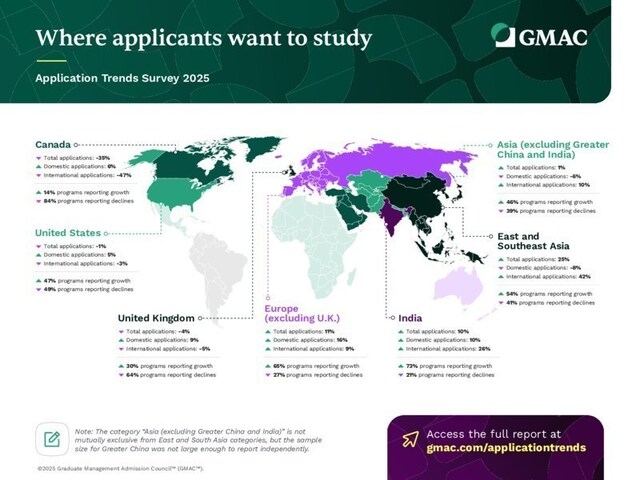
News
October 22, 2025
Global Demand for Business Education Grows Amid Economic and Geopolitical Uncertainty
GMAC's latest Application Trends Survey shows student mobility is shifting away from English- speaking countries while schools accelerate AI, sustainability integration. RESTON, Va., Oct. 21, 2025 /PRNewswire/ -- Graduate management education (GME) programs worldwide saw a 7 percent rise...
Global demand for business education is on the rise, with applications to graduate management education (GME) programs increasing by 7 percent worldwide, according to the latest Application Trends Survey from the Graduate Management Admission Council (GMAC). This surge comes at a time of significant economic and geopolitical uncertainty, suggesting a growing desire among individuals to enhance their skills and knowledge to navigate the complex challenges of the modern business world.
The survey, released on October 21, 2025, reveals a noteworthy shift in student mobility. While traditionally, English-speaking countries have been the dominant destinations for aspiring business leaders, the report indicates a gradual movement away from these regions. This could be attributed to various factors, including evolving visa policies, rising tuition costs, and the increasing appeal of programs offered in other parts of the world. The GMAC report suggests students are increasingly considering programs closer to home or in emerging markets that offer unique perspectives and opportunities.
Beyond the geographical shifts, the survey highlights a significant trend in curriculum development: the accelerated integration of artificial intelligence (AI) and sustainability into GME programs. Business schools are recognizing the critical importance of these topics and are actively adapting their curricula to equip students with the skills and knowledge necessary to succeed in a rapidly evolving business landscape. The integration of AI focuses on preparing future managers to leverage these technologies for strategic decision-making, process optimization, and innovation. Sustainability initiatives aim to foster a deeper understanding of environmental, social, and governance (ESG) factors and their impact on business performance.
This proactive approach reflects a broader understanding that future business leaders must be equipped to navigate not only traditional business challenges but also the ethical and societal implications of technological advancements and the urgent need for sustainable business practices. The increasing demand for GME programs, coupled with the shift in student mobility and the focus on AI and sustainability, paints a picture of a dynamic and evolving business education landscape that is adapting to meet the demands of a rapidly changing world.
The survey, released on October 21, 2025, reveals a noteworthy shift in student mobility. While traditionally, English-speaking countries have been the dominant destinations for aspiring business leaders, the report indicates a gradual movement away from these regions. This could be attributed to various factors, including evolving visa policies, rising tuition costs, and the increasing appeal of programs offered in other parts of the world. The GMAC report suggests students are increasingly considering programs closer to home or in emerging markets that offer unique perspectives and opportunities.
Beyond the geographical shifts, the survey highlights a significant trend in curriculum development: the accelerated integration of artificial intelligence (AI) and sustainability into GME programs. Business schools are recognizing the critical importance of these topics and are actively adapting their curricula to equip students with the skills and knowledge necessary to succeed in a rapidly evolving business landscape. The integration of AI focuses on preparing future managers to leverage these technologies for strategic decision-making, process optimization, and innovation. Sustainability initiatives aim to foster a deeper understanding of environmental, social, and governance (ESG) factors and their impact on business performance.
This proactive approach reflects a broader understanding that future business leaders must be equipped to navigate not only traditional business challenges but also the ethical and societal implications of technological advancements and the urgent need for sustainable business practices. The increasing demand for GME programs, coupled with the shift in student mobility and the focus on AI and sustainability, paints a picture of a dynamic and evolving business education landscape that is adapting to meet the demands of a rapidly changing world.
Category:
Business